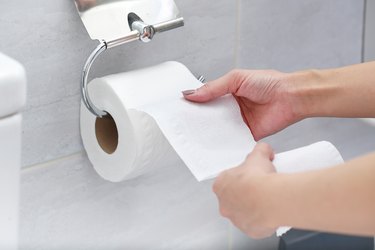
When you're trying to take care of business in the bathroom, ever notice that your leg or foot falls asleep?
That numbness and tingling is usually nothing to worry about, but it can be uncomfortable. Here, discover the mistakes you might be making that cause those pesky pins and needles and learn how to stop your legs from falling asleep on the toilet.
Video of the Day
Video of the Day
3 Reasons Your Legs Fall Asleep on the Toilet
Niket Sonpal, MD, a New York-based internist and gastroenterologist, shares several common causes of numb feet and legs on the toilet.
1. You're Straining
Straining to push "during a bowel movement increases pressure within the abdomen and raises the spinal column's pressure," Dr. Sonpal says. "This pressure can sometimes cause the spinal discs to move against nerves in the spine, leading to numbness, weakness and tingling" in the legs and feet, he explains.
2. You're Not Sitting With Good Posture
You're more likely to lose feeling in your lower extremities when you practice poor posture on the john. "Sitting on the toilet in an awkward position can compress nerves or blood vessels, resulting in the pins-and-needles sensation," Dr. Sonpal says.
Slumping (read: huddled over your phone when you're on the throne) is a common culprit.
"Most people tend to hunch over during a bowel movement, which hinders blood flow to the nerves in your pelvis. These nerves also stretch down to your feet, explaining why someone might feel the tingling sensation even in their toes," he says.
3. You're on the Toilet for Too Long
Numbness and tingling just get worse if you camp out on the toilet for too long, Dr. Sonpal says. So, if you're struggling with constipation, and your poop isn't passing quickly, you might notice pins and needles in your lower body as time ticks away.
How to Stop Your Legs From Falling Asleep on the Toilet
While pins and needles on the can aren't worth stressing over, there are ways to tamp down the tingling.
Just keep in mind if you're experiencing persistent numbness, you should seek the help of a medical professional, as this could be a sign of an underlying medical issue.
1. Don’t Hunch
"Hovering in a hunched position can be hard on the pelvic floor muscles, preventing the colon from fully relaxing and passing stool effortlessly," Dr. Sonpal says.
And the longer it takes for you to go, the more likely you'll experience the tingling in your legs.
"The best way to prevent losing feeling in the legs and feet is to sit in the proper, relaxed position," which, according to Dr. Sonpal, is upright with your knees higher than your hips.
2. Don’t Linger
Dr. Sonpal recommends you "avoid spending longer than five to 10 minutes on the toilet seat, and if you are straining to pass the stool, get up and try again in 15 minutes."
Remember, "bowel movements should be easy, quick and effortless," he says, adding that you might need to drink more water and get more foods high in fiber in your diet to loosen up and soften poop.
3. Get a Toilet Stool
Propping your feet up on a bathroom stool "can help the rectal canal be more open, which means less straining, easier bowel movements and less time spent on the toilet," Dr. Sonpal says.
Shop our picks for the best toilet stools for healthier pooping.
4. Try a Toilet Cushion
Toilet cushions or padded toilet seats "can also give the buttocks and pelvic region more cushion, improving blood flow to the feet," Dr. Sonpal says.
Shop our picks for the best raised toilet seats.
Is this an emergency? If you are experiencing serious medical symptoms, please see the National Library of Medicine’s list of signs you need emergency medical attention or call 911.



